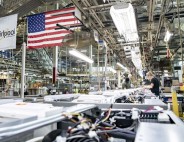
Is American Preparing for the Wrong Future?
03 Aug, 2017
The past is gone forever, yet we can’t stop talking about “bringing jobs back.” Ed Hess says we must stop yearning for yesterday and start transforming ourselves, our kids, and our institutions—and above all, our “me”-centric culture—to meet the needs of a future where technology reins and a focus on “Otherness” is the key to survival.
America has a big problem. Our jobs are going to go away, and, collectively, we’re acting as if nothing is going to change.
Leaders fixate on “bringing back manufacturing jobs.” But here’s the thing: If we do bring them back, they still won’t be done by humans. They’ll be robot jobs. That’s why Ed Hess says the real problem is our mindset—rather than blaming others for our fortune and trying to resurrect the past, we need to be preparing for a very different kind of future.
“We’re being pummeled by a double whammy,” says Hess, coauthor along with Katherine Ludwig of Humility Is the New Smart: Rethinking Human Excellence in the Smart Machine Age. “One, we’re chasing the wrong cause of the problem. It’s not immigrants or overseas workers who are stealing our jobs. It’s technology. The past is gone forever, and the future is happening faster and faster. And it will upset everyone’s apple cart.”
As a nation, we’re simply not talking about the real potential loss of 60 to 80 million U.S. jobs that will likely occur according to highly credible research in the next 10 to15 years because of advancing technology. In fact, in some cases our leaders are outright wrong. Steve Mnuchin, the Secretary of the Treasury, was recently quoted in a CNBC article as saying he wasn’t worried about artificial intelligence displacing our jobs “for at least 50 to 100 years.”
“The facts are that artificial intelligence is here now, and it will over the next 10 years advance to automate millions of service and professional jobs,” asserts Hess. “The best research to date says that nearly 50 percent of our jobs will be automated, and that may be just the beginning because technology will continue to advance and get smarter.
“The second ‘whammy’ is this,” he adds. “The skill set we’re going to need to compete with the smart robot—emotional intelligence; empathy; the ability to think critically, creatively, and innovatively; and to emotionally connect with others so we can effectively collaborate and work in teams—is the antithesis of what we’re teaching our kids. In fact, our society has never been more lacking in it.”
So what can we do to make sure we’ll be able to survive in the future? Hess sums up the solution as Otherness, meaning a focus on “WE”—sharing, collaborating, teamwork—all the things even the smartest smart robot can’t do. This is the skill set that will enable us to find work in a high-tech global economy. And it’s virtually nonexistent right now.
“Excelling in tomorrow’s job market will require personal and cultural transformation,” says Hess. “Individually and collectively we must master our egos, practice humility and re-think our workplaces and institutions. This will be very, very hard work—but it’s high time we quit yearning for the past and start figuring out how to preserve the American Dream.”
About the Authors:
Ed Hess, Professor of Business Administration and Batten Executive-in-Residence at the Darden Graduate School of Business, and Katherine Ludwig are the authors of the new book Humility Is the New Smart: Rethinking Human Excellence in the Smart Machine Age (Berrett-Koehler, 2017), which puts forth a new model called NewSmart, designed to help humans thrive alongside technology in the Smart Machine Age.
For more information, visit www.edhltd.com and www.katherineludwig.com.
Related Posts
-

PHARMACEUTICAL GIANT LILLY PLANS $6 BILLION ADVANCED MANUFACTURING PLANT IN HUNTSVILLE, ALABAMA
-

KOREA ZINC SELECTS TENNESSEE FOR FIRST U.S. OPERATIONS, ANNOUNCES $6.6 BILLION INVESTMENTKOREA ZINC SELECTS TENNESSEE FOR FIRST U.S. OPERATIONS, ANNOUNCES $6.6 BILLION INVESTMENT
-

GOVERNOR GLENN YOUNGKIN ANNOUNCES LS CABLE & SYSTEM LTD.’S $689 MILLION INVESTMENT IN CHESAPEAKE, VIRGINIA
-

INVEST ONTARIO TO SUPPORT MARVELL R&D WORKFORCE EXPANSION TO DRIVE NEXT-GEN AI INFRASTRUCTURE DEVELOPMENT
-

Airbus inaugurates new A320 Final Assembly Line at Mobile facility
-

Welspun Tubular to Invest $150 Million in New LSAW Pipe Mill in Little Rock, Arkansas
-

Whirlpool Corporation Announces $300 Million Investment in U.S. Laundry Operations, Creating 400-600 New Jobs in Ohio
-

Merck Breaks Ground on $3 Billion Center of Excellence for Pharmaceutical Manufacturing in Elkton, Virginia
-

Eos Energy to Relocate Headquarters to Pittsburgh and Expand PA-Based Battery Manufacturing Operations in Allegheny County with $353 Million Investment
-

GE APPLIANCES ANNOUNCES HISTORIC $3 BILLION INVESTMENT TO EXPAND U.S. MANUFACTURING










